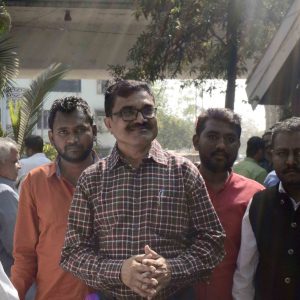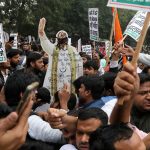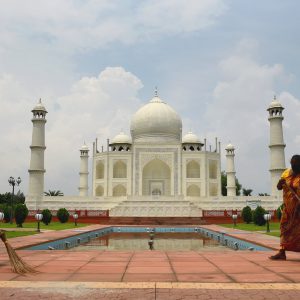Modi widens the assault on India’s democratic forces
The Indian police are increasingly invoking stringent anti-terror laws against Muslims and Left activists who oppose the government’s contentious and religion-based citizenship legislation.
Author:
22 September 2020

Widening the crackdown on civil liberties activists, police officers in India have arrested former student leader Umar Khalid, allegedly in connection with riots that erupted in parts of northeast Delhi earlier this year. The detention accentuates what critics have called out as increasing authoritarianism under Prime Minister Narendra Modi, and marks the latest assault in a series of attacks on intellectuals and dissenters in the country over the past two years.
The Delhi Police’s Special Cell arrested Khalid under the stringent Unlawful Activities (Prevention) Act (UAPA) for his alleged role in the violence sparked by the controversial Citizenship Amendment Act (CAA) in which more than 50 people – mostly Muslim – were killed. The police allege that Khalid, along with other activists involved in protests against the contentious citizenship law, “conspired” to trigger riots to embarrass the Modi government at a time when United States President Donald Trump was visiting the country.
The detention comes days after the police revealed that parliamentarian and Communist Party of India (Marxist) general secretary Sitaram Yechury, renowned economist Jayati Ghosh, Delhi University professor Apoorvanand, documentary filmmaker Rahul Roy and Swaraj Abhiyan leader Yogendra Yadav were charged as “co-conspirators” in the same case.
The names were included in the supplementary charge sheet that the police filed against arrested activists Gulfisha Fathima, Devangana Kalita and Natasha Narwal. Kalita and Narwal are members of Pinjra Tod (Break the Cage), a feminist collective of students and alumni of colleges from Delhi. Fatima is a rights defender actively involved in the women-led protest against the CAA. Jamia Millia Islamia student Meeran Haider and fellow Jamia Coordination Committee member Safoora Zargar are also among those arrested under the UAPA for allegedly planning the violence.
Related article:
The Delhi Police clarified that Yechury and others were on the charge sheet only because some of the accused had mentioned them in their disclosure statements, but under Indian laws such confession made in the presence of a magistrate can be used as evidence. “The supplementary CS [charge sheet] proclaims that the accused persons were ‘continuously poisoning the minds of common people against the CAA/NRC [National Register of Citizens]’. This is the government’s political position, surprisingly being parroted in the supplementary CS as a legal offence,” said Apoorvanand, adding that the police need to stop criminalising the anti-CAA protests that are a perfectly legitimate act of citizenship.
In an interview with online news platform The Wire, Yechury said police investigations into riots have unfolded as a blatantly politically partisan exercise to target opposition leaders and activists who peacefully protested against the CAA, adding that the charges against him are “absolutely fabricated”.
Khalid’s name appeared on the charge sheet the police submitted when they arrested Aam Aadmi Party legislator Tahir Hussain. The police claimed that Hussain, along with Khalid and others, were preparing “for something big/riots at the time of the visit of the US president”.
Khalid had dismissed the allegations weeks before his arrest, calling the claims a “motivated campaign” against him. In September, he alleged that the police had pressured his acquaintance into signing a false, predrafted statement against him. “Despite not having a legal case or evidence against me, they [the Delhi Police] are attempting to build a narrative in the minds of the general public to create ground to take action against me based on such obviously false accounts and fabricated statements,” Khalid wrote in an open letter to Commissioner of Delhi Police SN Shrivastava.
Condemnation against the cases
The left-wing All India Students Association said the police claim of a conspiracy is “not only laughable but points fingers” at the credibility of the investigation, asserting that activists, students and political leaders who took part “in the spontaneous protests were fighting to defend the Constitution and plurality of our society”. The Communist Party of India (Marxist-Leninist) Liberation said the Modi government was using the Delhi Police’s investigation as a witch-hunt of students, intellectuals, Left leaders and dissenting voices. “They hope to silence and terrorise the Left and democratic movement, but their actions will have the opposite effect,” it said.
“The central government must stop the practice of the Special Branch summoning anti-CAA activists for questioning and trying to coerce them into implicating those targeted by the home ministry and the police,” the Communist Party of India (Marxist) said.
Related article:
Activist group United Against Hate, of which Khalid is a member, said the “fairy tale narrative” that the police were “spinning” to criminalise protests, in the garb of investigating riots, found yet another victim. A group of rights activists, academics and lawyers underscored that Khalid had been subjected to a “malicious” investigation that was targeting peaceful anti-CAA protesters.
“With deep anguish, we have no doubt in saying that this investigation is not about the violence in February 2020 in the national capital, but on the completely peaceful and democratic protests across the country against the unconstitutional CAA,” the group said.
Khalid’s father, Sayed Qasim Rasool Ilyas, further accused the police of trying to mute the voices of dissent against the government and weaving a false story against anti-CAA protests, including Khalid, as the “masterminds” behind the violence. “However, everyone knows who was actually behind the riots,” he said, in a veiled jibe at the role of the ruling Bharatiya Janata Party (BJP) legislators in fanning the anti-Muslim riots.
Instigators roam free
The Delhi riots are widely acknowledged to have been sparked by incendiary comments made by BJP leader Kapil Mishra, who gave the police a “three-day” ultimatum to get the roads cleared of anti-CAA protesters largely led by Muslim women. Video evidence and witness accounts clearly pointed to the police allowing Hindu mobs to roam the streets freely and target the Muslim neighbourhood and businesses.
The police in Delhi have been accused of turning a blind eye to the role of leaders such as Mishra, Anurag Thakur and Parvesh Verma, who openly threatened violence. Mishra led a march in December in support of the CAA, following which a video of him surfaced on social media in which he could be heard shouting the inflammatory slogan “Desh ke gaddaron ko, goli maaro saalon ko (Shoot the traitors of our country)”.
Though the party officially distanced itself from Mishra’s march, several party leaders were seen on camera mouthing the same slogan. Modi’s party had run a high-pitch communal campaign against anti-CAA protesters and Muslims in the run-up to the Delhi assembly polls in February. The Election Commission even banned Mishra from campaigning after he posted communal tweets on social media, in which he called anti-CAA protesters “Pakistani rioters”.
In a scathing attack on the Delhi Police’s role in targeting civil rights activists, India’s most celebrated senior cop Julio Ribeiro accused the law enforcement agency in a letter to police commissioner Shrivastava of “deliberately” failing to register known offences against those who made hate speeches that triggered the riots. “It troubles sane and apolitical persons, like me, why Kapil Mishra, Anurag Thakur and Parvesh Verma have not been arraigned before the courts of law while deeply hurt Muslim women, peacefully protesting against discriminations based on religion, were lodged for months together in jail,” he wrote.
A pattern in the crackdown
The Delhi Police have been accused of using the same “tactic” as that used in the Bhima Koregaon case, in which several intellectuals and activists have been accused of conspiring with Maoists – an anti-state, Left-Marxist armed movement – to foment violence at a gathering in the town of Bhima Koregaon in Maharashtra state in January 2018.
In April, the police arrested journalist Gautam Navlakha and academic Anand Teltumbde. Nine other prominent activists, including law professor and trade unionist Sudha Bharadwaj, academic and women’s rights activist Shoma Sen, Dalit activist Surendra Gadling and Maoist ideologue Varavara Rao, have been in jail since 2018 in the same case. Teltumbde wrote an open letter in which he underscored the role of the Rashtriya Swayamsevak Sangh, a far-right Hindu nationalist group of which Modi has been a lifelong follower, in fabricating the case against him.
In February, the police arrested activist Sharjeel Imam for allegedly making inflammatory speeches during an anti-CAA protest and charged him with sedition. Delhi University professor GN Saibaba, who uses a wheelchair, is a leading voice defending the rights of religious minorities. He was sentenced to life imprisonment in 2017 for “waging war against the state”. Police officers in the BJP in Uttar Pradesh charged a doctor, Kafeel Khan, under the National Security Act, which stipulates that a person can be held without charge for a year. Khan was arrested for a speech in which he criticised the CAA.
A weapon against dissent
Modi’s ruling party has often been accused of using dog-whistle politics to stir up communal tension and stoke sectarian politics. In addition, critics of Modi’s government have often been branded as “urban Maoists”, or “anti-nationals”. As such, Indian authorities regularly invoke seditious laws, including the draconian UAPA, as a weapon against those seen as opposed to the Modi government and party. Critics have denounced the UAPA, which they say introduces a vague definition of terrorism to encompass a wide range of non-violent political activity, including political protest.
Amnesty International has accused the Modi government of using the UAPA to “harass, intimidate and imprison peaceful student protesters”. They underscored that the slow investigative processes and extremely stringent bail provisions under this law ensure that protesters are locked up for years without trial, turning the process into punishment.
“The state is using sedition as an iron hand to curb free speech, which I think is an overreaction to people’s expression of opinion,” noted former judge of the Supreme Court of India Madan B Lokur. He added that apart from using the sedition law, another method the state has adopted to curb free speech is to crack down on critical opinions by charging them with spreading fake news.
Related article:
According to Ashok Swain, a professor of peace and conflict research at Uppsala University, when Modi’s right-wing government came to power, an independent-looking Supreme Court had given the hope that it would act as a bulwark against any impending attacks on the secular character of the Indian Constitution. But the expectation was “wishful thinking”, as the court’s benches have been filled with predominantly upper-caste Hindu men.
“Hindu superiority is ingrained in their thinking and beliefs. The present chief justice is from the Hindutva heartland Nagpur and is proud of his family’s association with Hindutva ideologue Savarkar,” Swain said. He added that the upper caste-dominated judiciary creates further hopelessness about India’s future and its inclusive and secular character.
Swain further highlighted that the Supreme Court of India initiating the process for the Modi government to pass a law to criminalise triple talaq (Islamic divorce), the court guiding the creation of a national register of citizens in Assam that targets Muslim migrants and its refusal to put on hold the implementation of the CAA, which discriminates against Muslim refugees, are clear examples of the bias.



